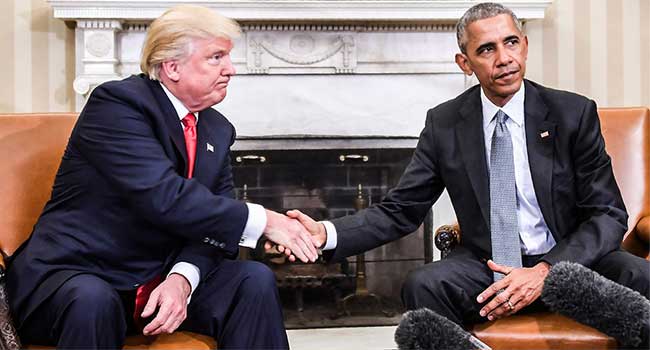
Trump Accuses Obama of “Wire Tapping” Trump Tower Phones
Over the weekend, President Trump used his Twitter account to inform the public that he “found out” former-president Obama had “wire tapped” the Trump Tower phones before the election last November.
“Terrible! Just found out that Obama had my “wires tapped” in Trump Tower just before the victory. Nothing found. This is McCarthyism.” President Trump tweeted.
Trump continued to tweet his grievances with the former president, saying “I’d bet a good lawyer could make a great case out of the fact that President Obama was tapping my phones in October, just prior to Election!”
An Obama spokesman pushed back against the accusations on Saturday.
"A cardinal rule of the Obama Administration was that no White House official ever interfered with any independent investigation led by the Department of Justice," said Kevin Lewis, an Obama spokesman. "As part of that practice, neither President Obama nor any White House official ever ordered surveillance on any U.S. citizen. Any suggestion otherwise is simply false."
Former national security adviser Ben Rhodes also tweeted to Trump about the accusations, stating that “No President can order a wiretap.”
It appears Trump may have gotten his information from reporting that U.S. officials secretly monitored a computer server in Trump Tower to determine whether there were links to Russian banks. A New York Times article published on Jan 19 – just one day before the Trump inauguration – reported that U.S. law enforcement and intelligence agencies had intercepted communications and financial transactions as part of a probe of links between Trump’s campaign and Russian officials.
On Sunday, the White House officially asked Congress to investigate the claim despite the fact President Trump had no evidence to back up his allegations.
"What we need to deal with is evidence, not just statements," U.S. Senator Susan Collins, a Maine Republican who serves on the Senate Intelligence Committee, said on CBS's "Face the Nation," adding she also had not seen evidence of collaboration "but we are in the very early stages of our investigation."
On Sunday evening, the FBI asked the Justice Department to refute the President’s assertion that former-president Obama had ordered the wiretapping of phones in Trump Tower.
The FBI made the request because such wiretapping would be illegal, since the President cannot just order the eavesdropping of a U.S. citizen’s phones. A court would have to approve any request to wiretap.
Sources told CNN that it would be more appropriate for the Justice Department to publically address the accusations since the bureau as a policy does not confirm or deny allegations.
“Neither the White House or nor the President will comment further until such oversight is conducted,” White House Press Secretary Sean Spicer said.